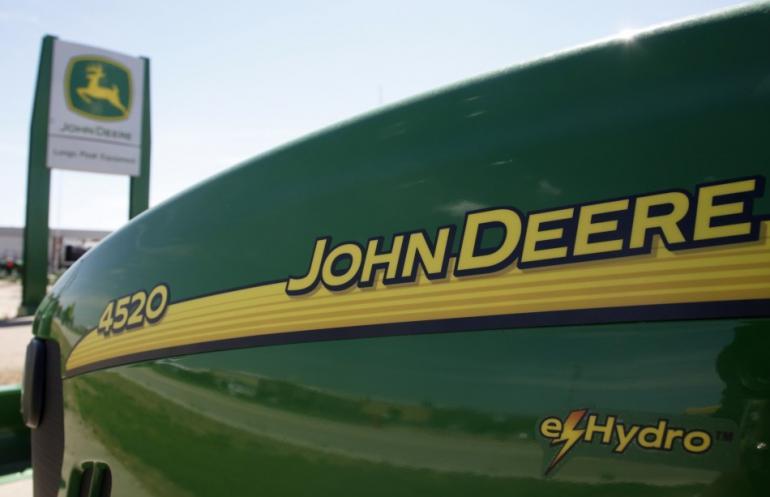According to reports from the Iowa Department of Revenue, an obscure tax break—the Research Activities Credit—has allowed major corporations to receive millions of dollars in tax refunds from the state without paying a dime in state corporate income tax.
Exactly how much Iowa has paid to companies such as Deere and Company and Monsanto since the RAC was created in 1985 is impossible to determine. The IDR wasn’t required to issue reports on the tax credit until 2009, and 2010 was the first full year covered by annual reports.
The RAC allows companies to claim a tax credit equal to 6.5 percent of its Iowa-apportioned research activities. Although most states offer research-and-development tax credits, Iowa is one of only seven states in which that credit is refundable. This means they receive money from other taxpayers if their RAC tax credit is more than what they owe in taxes.
Lion’s Share to 12 Companies
In 2013, 185 companies claimed $53.5 million under the RAC and a supplemental RAC, but almost 87 percent of it went to just 12 big companies.
Deere and Company, which reported profits of more than $3.5 billion in 2013, was last year’s biggest RAC claimant, receiving $13.8 million.
This is almost the exact opposite of how it was proposed the RAC would work when it was sold to the Legislature and public in 1985. It was supposed to help start-up companies in Iowa, not fatten the bottom line of big corporations headquartered out of state.
Even though almost all benefits of the RAC go to already-profitable larger companies, the Iowa Economic Development Authority still claims it is important for job growth in Iowa.
“It’s an important element in our toolbox,” Tina Hoffman, IEDA’s marketing and communications director, told Iowa Watchdog.
“Research is tied to manufacturing and leads to new production lines,” Hoffman explained. “It creates the sort of high-skill, high-wage jobs we want in Iowa.”
But Hoffman’s confidence in the RAC isn’t supported by economists who have studied it.
‘Not Possible to Measure’
A study of the RAC published in 2011 by the IDR concluded “it is not possible to measure the extent to which the credit drives the amount of research conducted in Iowa.”
And to whatever extent the RAC is driving research, the results are not impressive.
According to a 2010 study of research activities in Iowa conducted by two Iowa State University economists, “there is no clear evidence that the state’s competitive position in terms of overall R&D activity or total productivity growth as measured by GDP have improved during the two decades of the RAC program’s existence.”
Evidence is also lacking for the high-wage part of the “high-skill, high-wage jobs” the IEDA claims the RAC creates.
The 2011 IDR study states “an analysis of wages paid by companies with credit claims did not show those companies pay higher average wages to employees compared to companies in the same industry with no credit claims.”
Barely Used by Start-Ups
As for helping Iowa start-ups, the IDR study concludes, “the credit is not heavily utilized by start-up companies.” Between 2006 and 2009 “just over one percent” of new companies filed an RAC claim.
According to the IDR study, the most remarkable thing about the RAC is the unusually large amount it pays in refunds to “large, multi-state research companies” that pay no state corporate income tax.
Iowa pays approximately 63 percent more to such companies than other states the study examined, rhe report stated.
Just thinking about the RAC as a tax break for big companies obscures its real impact on the state, says Mike Owen, executive director of the nonpartisan Iowa Policy Project and a longtime critic of the RAC.
Decided ‘Outside the Budgeting Process’
“This is a budget decision that’s being made outside the budgeting process,” Owen said. “The money for the refund checks being sent to those companies comes out of the state’s general fund. It could be used for other purposes, like funding schools.”
But because the RAC is a permanent part of the tax code and doesn’t need to be renewed, the question of how it affects the state budget is seldom considered.
“It’s been a long time since the Legislature has taken a serious look at it,” Owen said.
Still, he says he’s hopeful the information provided in annual reports on the RAC will eventually lead lawmakers to reconsider it.
“Iowa taxpayers should be allowed to decide whether they want to be sending those checks to those already very profitable companies,” Owen said. “Whether the money is going to be sent to the shareholders of Deere and Company or spent on needs in the state isn’t a decision that should be made on autopilot, like it is now.”
Paul Brennan ([email protected]) reports for IowaWatchdog.org, where this article first appeared. Reprinted with permission.
Internet Info
“Iowa’s Activities Tax Credit: Tax Credits Program Evaluation Study,” Iowa Department of Revenue: heartland.org/policy-documents/iowas-research-activities-tax-credit-tax-credits-program-evaluation-study



